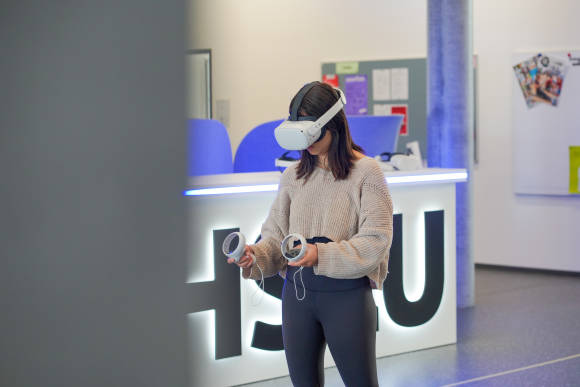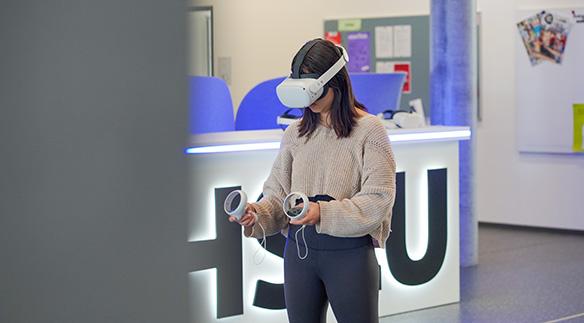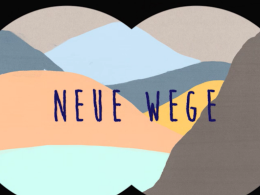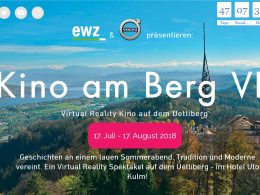From autumn 2024, Lucerne University of Applied Sciences and Arts will offer Switzerland's first Bachelor's degree course in immersive technologies. Graduates will be able to use innovative approaches such as virtual reality in a variety of ways.
 The Immersive Realities Research Lab of the Lucerne University (HSLU) has existed since 2018 and is investigating how augmented and virtual reality can be used. Having already offered a Master's degree programme, the HSLU is now also offering a Bachelor's degree programme: At its meeting on 29 September 2023, the HSLU Concordat Council approved the introduction of a Bachelor of Science in Immersive Technologies.
The Immersive Realities Research Lab of the Lucerne University (HSLU) has existed since 2018 and is investigating how augmented and virtual reality can be used. Having already offered a Master's degree programme, the HSLU is now also offering a Bachelor's degree programme: At its meeting on 29 September 2023, the HSLU Concordat Council approved the introduction of a Bachelor of Science in Immersive Technologies.The new course will start in autumn 2024 at the Zug-Rotkreuz campus. The aim of the English-language degree programme is to train specialists in the fields of augmented and virtual reality, serious games and immersive media production. These technologies are "immersive" because they make it possible to immerse oneself in virtual or fictional worlds - merging the physical world with digitally augmented or simulated reality. After graduating, students can design and develop immersive solutions, products and services for numerous industries. Professional fields of application include development and research departments of companies, educational institutions, research laboratories or creative agencies.
Unique offer in Switzerland
With this degree programme, Central Switzerland as a university location will be enriched by an offer that does not yet exist anywhere else in Switzerland. This is despite the fact that the demand for specialists is high: "The fusion of reality and virtuality offers companies a wide range of potential," says programme director Prof. Nathaly Tschanz. "The use cases are already becoming increasingly diverse." Augmented and virtual reality can be used to simulate production processes and realise cost-effective prototypes, for example. For surgeons, this opens up the possibility of training operations virtually in order to gain confidence; in urban planning, three-dimensional visualisations improve the basis for decision-making. So-called "serious games" are also on the road to success: in a playful way but with a serious goal, they are used, for example, in the treatment of anxiety disorders or rehabilitation after a stroke.
Study programme for creative technology enthusiasts
The Bachelor's degree programme is aimed at creative people with an affinity for technology who are interested in computer science as well as visual and creative implementation. "Immersive technologies are user-centred: they appeal to those who want to work at the interface between man and machine," adds Tschanz. The degree programme has a practical and strongly project-oriented structure - in line with the principle of "learning by doing". In terms of content, the focus is on specialist skills in augmented, virtual and mixed reality, game design & development and 3D modelling. Students also acquire a basic understanding of related subject areas such as human-computer interaction, immersive storytelling and agile project management. Cooperations with internationally active companies and university partners play a central role in the curriculum. This allows students to gain international experience early on and acquire intercultural skills. The English language of instruction also contributes significantly to this.
Further information: hslu.ch/immersive-realities-centre
Source: MM









